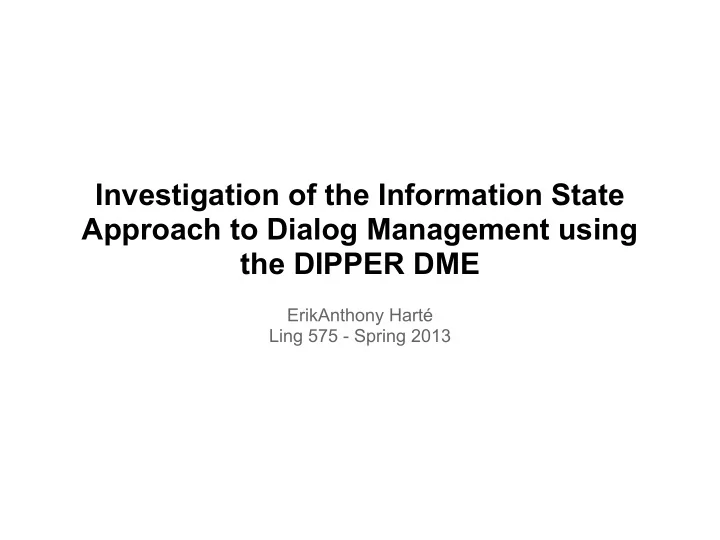

Investigation of the Information State Approach to Dialog Management using the DIPPER DME ErikAnthony Harté Ling 575 - Spring 2013
Project goals (original) ● Implement a Call For Fire (CFF) Dialog System ● Experiment with Information State Update and Dialog Move Engines
SDS Pipeline
DIPPER ● Developed by the Language Technology Group at The University of Edinburgh and CSLI Stanford ● Toolkit for prototyping dialog systems ● Modelled closely after TrindiKit, but... ○ Simpler framework ○ Not so Prolog-y ○ Tightly coupled with OAA ● Dipper_java ● Information State Update (ISU) approach ○ Information State - captures state of dialog, beliefs, goals, etc. ○ Update Rules - manages transitions between finite states
DIPPER - Information State infostate(record([is:record([ grammar:atomic, contact:atomic, input:queue(move), lastmoves:record([ string:stack(word), act:stack(atomic), udr:stack(udr), conf:stack(atomic), int:list(interpretation) ]), int:record([ model:stack(model), drs:stack(drs) ])])])).
DIPPER - Update Rules urule(initialisation, [ is^grammar = '', empty(is^input) ], [ assign(is^contact,no), assign(is^listening,no), assign(is^grammar,'.Hotword') ]). urule(start_eavesdropping, [ is^contact = no, is^grammar = '.Hotword', is^listening = no, empty(is^input) ], [ solve(recognize(is^grammar,30,[Move|_]),[enqueue(is^input,Move), assign(is^listening,no)]), assign(is^listening,yes) ]).
OAA - Open Agent Architecture ● Developed by SRI ● Framework for building communities of heterogenous software agents ● ICL - InterAgentCommunication Language (Prolog based) ● Agents communicate with each other through a Facilitator via solvables ● Solvables announce and request agent capabilities within the community Example: A mail service agent might register these solvables: [solvable(send(mail, ToPerson, Msg), [callback(send_mail)], []), solvable(last_message(MessageNum), [type(data), single_value(true)], [write(true)]), solvable(get_message(MessageNum, Msg), [callback(get_mail)], []) ]).
OAA Monitor
The Project: Implement CFF Dialog Dialog Move Engine ● Information state ● Update rules OAA Agents ● Natural Language Understanding ● Language Generation
Limited CFF Dialog 3 Phases ● Indentification ● Targeting ● Authentication If time allows... ● Grounding ● Correction Example: U: "B456, this is A123, over." S: "A123, this is B456, out." U: "Target is truck at location Grid12, over." S: "Roger. Target truck at location Grid12, out."
Finite State Machine (~20 states)
CFF Information State
CFF Update Rules (~25 rules)
Implementation
Conclusions ● ISU interesting and very flexible - supports a wide variety of dialog management approaches ● OAA architecture allows for independent modules to be built ● Toolkits allow relatively easy prototyping, and (with effort) the ability to build usable systems Issues ● Difficult to use, especially TrindiKit ● Prolog knowledge essential ● Little documentation, particularly DIPPER. As well as lack of current support. ● Difficult to manage rules and state with complicated dialogs
References 1. DIPPER: Description and Formalisation of an Information-State Update Dialogue System Architecture (2003). Johan Bos , Ewan Klein , Oliver Lemon , Tetsushi Oka. In 4th SIGdial Workshop on Discourse and Dialogue 2. Staffan Larsson and David Traum (2000): Information state and dialogue management in the TRINDI Dialogue Move Engine Toolkit. In Natural Language Engineering Special Issue on Best Practice in Spoken Language Dialogue Systems Engineering, Cambridge University Press, U.K. (pp. 323-340, 18 pages) 3. David Traum and Staffan Larsson (2003): The Information State Approach to Dialogue Management. To appear in Smith and Kuppevelt (eds.): Current and New Directions in Discourse & Dialogue, Kluwer Academic Publishers. (pp. 325-353, 28 pages) Bohus, Dan & Alexander I. Rudnicky (2009), "The RavenClaw dialog management framework: 4. Architecture and systems", Computer Speech & Language
Recommend
More recommend